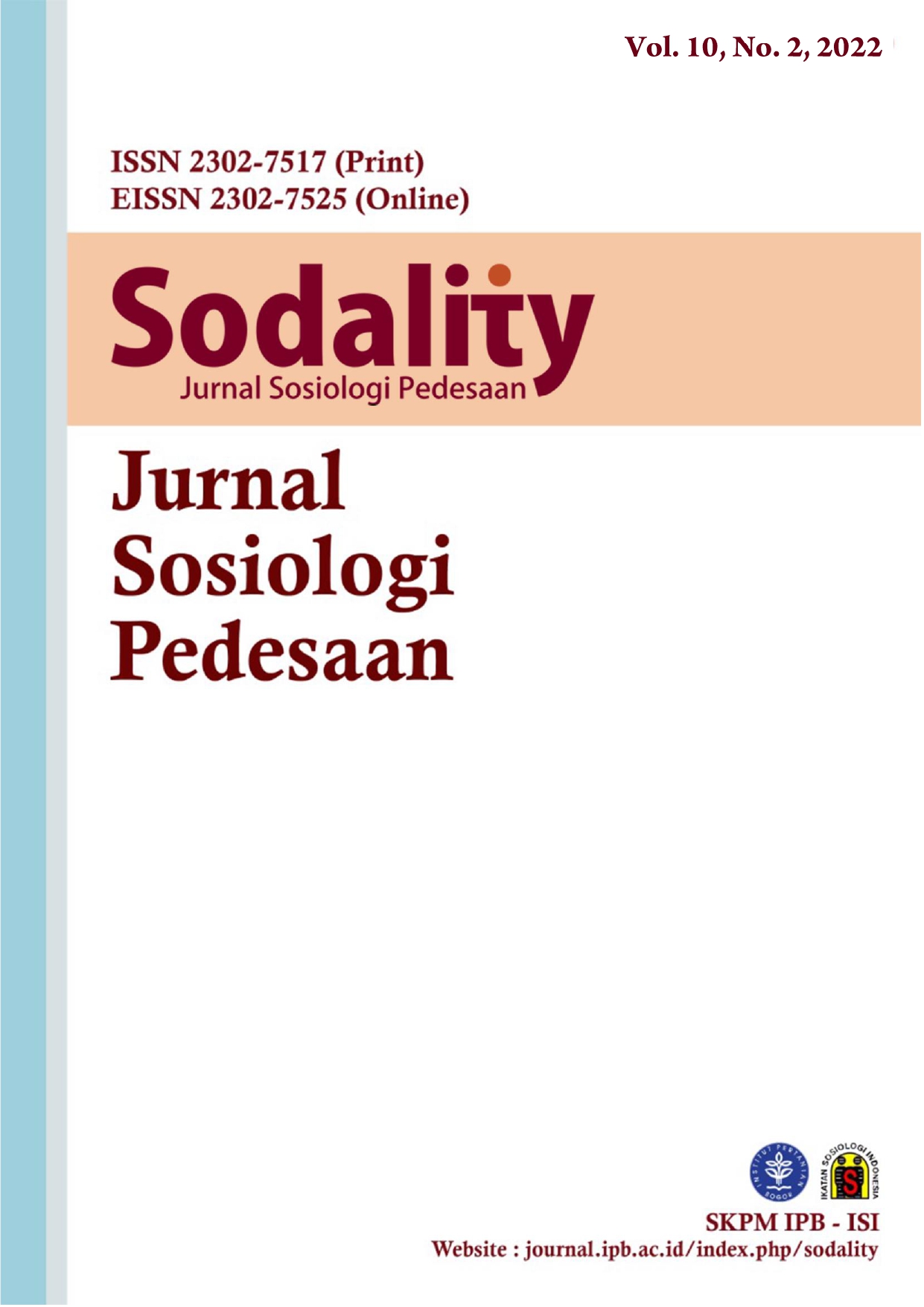Policy Focal-Point: Praxis in the Transformation of Local Wisdom-Based Tenun Ikat Clusters from an Ecofeminist Perspective in East Sumba Regency
Abstract
East Sumba Regency is included in the 3T area category (underdeveloped, isolated, and poorest). Covid-19 pandemic, flash floods, and Seroja hurricane are predicted to increase the worsening poverty. This condition encourages the pursuit internal strength to increase the community’s resilience. This paper describes two findings: 1) the praxis of focal point in the transformation of local wisdom-based tenun ikat (handwoven fabric) clusters from an ecofeminism perspective, and 2) best practices as the basis of integrating tenun ikat in the Regional Medium-Term Development Plan (Rencana Pembangunan Jangka Menengah Daerah/RPJMD) of East Sumba Regency. The paper uses several conceptual frameworks such as agent, agency, and agent network from an ecofeminism perspective. The research used the Participatory Action Research method from an ecofeminism perspective. The results show that the praxis of the focal point is significant in the transformation of local wisdom-based tenun ikat and the supervision of the integration of tenun ikat in policies implemented in the RPJMD of East Sumba Regency in 2021-2025.
References
Badan Pusat Statistik Kabupaten Sumba Timur. (2020). Statistik kesejahteraan rakyat Kabupaten Sumba Timur.
Bourdieu, P. (1977). Outline of a theory of practice. Cambridge University Press.
Gatenby, B., & Humphries, M. (2000). Feminist participatory action research: Methodological and ethical issues. Women’s Studies International Forum, 23(1), 89–105. https://doi.org/10.1016/S0277-5395(99)00095-3.
Giddens, A. (2010). The constitution of society: Outline of the theory of structuration. University of California Press.
Hartmann, H. (1976). Capitalism, patriarchy, and job segregation by sex. Signs: Journal of Women in Culture and Society, 1(3), 137–169. https://doi.org/10.1086/493283.
Hudang, A. K. (2016). Perencanaan pengembangan subsektor peternakan dalam upaya peningkatan perekonomian di Kabupaten Sumba Timur. Jurnal Riset Ekonomi Dan Manajemen, 16(2), 331–344. https://doi.org/.16.1602012.ID.
Hunga, A. I. R. (2016). Perjuangan perempuan melawan kemiskinan dan melestarikan budaya melalui tenun. In A. I. R. Hunga & D. Candraningrum (Eds.), Matra sustainable development goals dalam penghapusan kekerasan, trafficking, dan pemberdayaan perempuan. Kementerian Pemberdayaan Perempuan Republik Indonesia.
Hunga, A. I. R. (2021). Perempuan dalam pandemi Covid-19: Kerentanan, resiliensi, dan relevansi kehadiran negara (Studi kasus komunitas perempuan tenun dan batik). In D. Candraningrum, A. I. R. Hunga, & A. Dhewy (Eds.), Ekofeminisme V: Perempuan dalam pandemi Covid-19. Parahita Press.
Kapita, O. H. (1976a). Masyarakat Sumba dan adat istiadatnya. BPK Gunung Mulia.
Kapita, O. H. (1976b). Sumba di dalam jangkauan jaman. BPK Gunung Mulia.
Kementerian Kesehatan Republik Indonesia. (2018). Profil keluarga sehat provinsi Nusa Tenggara Timur. In Pusat Perencanaan dan Pendayagunaan Sdm Kesehatan Badan Pengembangan Dan Pemberdayaan Sdm Kesehatan Kementerian Kesehatan Ri 2018 (Vol. 2018).
Kindon, S., Pain, R., & Kesby, M. (Eds.). (2007). Participatory action research approaches and methods: Connecting people, participation and place. Routledge.
Parsons, W. (2011). Public policy: Pengantar teori dan praktik analisis kebijakan. Kencana Prenada Media Group.
Rhodes, R. A. W. (1990). Policy networks: A British perspective. Journal of Theoretical Politics, 2(3), 293–317. https://doi.org/10.1177%2F0951692890002003003.
Ritzer, G. (2014). Teori sosiologi modern (7th ed.). Kencana Prenada Media Group.
Shiva, V., & Mies, M. (2005). Ecofeminism: Perspektif gerakan perempuan dan lingkungan. IRE Press.
Authors who publish with this journal agree to the following terms:
- Authors retain copyright and grant the journal right of first publication with the work simultaneously licensed under a

This work is licensed under a Creative Commons Attribution 4.0 International License. that allows others to share the work with an acknowledgement of the work's authorship and initial publication in this journal. - Authors are able to enter into separate, additional contractual arrangements for the non-exclusive distribution of the journal's published version of the work (e.g., post it to an institutional repository or publish it in a book), with an acknowledgement of its initial publication in this journal.
- Authors are permitted and encouraged to post their work online (e.g., in institutional repositories or on their website) prior to and during the submission process, as it can lead to productive exchanges, as well as earlier and greater citation of published work (See The Effect of Open Access).





.png)









